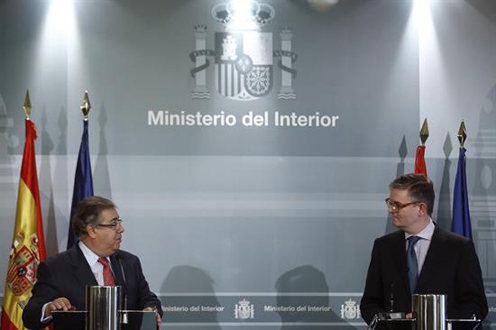Juan Ignacio Zoido informs European Commissioner Julian King of Spain's full support for building a safer Europe against security threats and challenges
News - 2017.2.21
At this meeting, which was also attended by Germán López, Director-General of the Spanish National Police Force and José Manuel Holgado, Director-General of the Spanish Guardia Civil, various issues were discussed regarding the fight against terrorism and the prevention of radicalisation, organised crime and cybercrime.
The Minister for Home Affairs, Juan Ignacio Zoido, informed European Commissioner Julian King that, in terms of the fight against terrorism, Spain's experience has shown that, "in order to defeat it, there is a need for ongoing and long-term efforts using all the instruments of the Rule of Law, as well as a firm political and social commitment and dedicated and ceaseless police and judicial action".
Juan Ignacio Zoido recalled that, during 2016, the counter-terrorism activity undertaken by Spain has led to 36 police operations with a total of 69 arrests based on links to Jihadi terrorism. He also underlined the importance of collaboration with third countries, particularly Morocco.
At the meeting, the Minister for Home Affairs expressed his satisfaction with the European Parliament agreement on the Directive on Combatting Terrorism, which Spain has firmly supported. In this regard, Juan Ignacio Zoido, told European Commissioner Julian King that "we should further strengthen the exchange of information and intelligence between Member States and involvement in the instruments created, such as the Europol Counter-terrorism Centre, run by Colonel Manuel Navarrete of the Spanish Guardia Civil".
Prevention and fight against violent radicalisation
Juan Ignacio Zoido explained to Julian King that Spain has adopted a series of organisational, legislative and radicalisation prevention measures to tackle this new terrorist threat. Specifically, the Minister for Home Affairs said that, back in 2015, Spain approved the National Strategic Plan on Combating Violent Radicalisation, which has led to a series of actions ranging from the drawing up of educational guidelines on the issue to the creation of Local Counter-radicalisation Groups involving municipal authorities, schools, social institutions, vulnerable groups, courts and local police forces.
Furthermore, Juan Ignacio Zoido highlighted the "STOP RADICALISMOS" platform that, via its website, facilitates public support for the identification of possible cases involving radicalised people in Spain. Since December 2015, this platform has received almost 3,000 messages, of which at least 37% have been considered to be of interest.
At the meeting, Juan Ignacio Zoido and Julian King also spoke about the protection for victims of terrorism. The Spanish minister told the European Commissioner that "the role played by the victims of terrorism is fundamental to violent radicalisation prevention policies". In this regard, he stressed that Spain provides "close" collaboration as part of the Radicalisation Awareness Network (RAN), as demonstrated by the latest meeting of the group of victims of terrorism that was held in Madrid last autumn, at which the Directorate-General of Support to the Victims of Terrorism of the Ministry of Home Affairs played "a highly active role".
Fight against organised crime
The Minister for Home Affairs, Juan Ignacio Zoido, highlighted Spain's commitment to each of the Priorities of the EU Political Cycle on the fight against organised crime and serious offences.
Juan Ignacio Zoido said that Spain is involved in the 13 Priorities and also recalled that Spain heads up the Priority on Cocaine and Firearms Trafficking and co-leads the Priorities on Illegal Immigration, Heroin Trafficking and Cyber Attacks.
The Minister for Home Affairs highlighted Operation "Ciconia Alba" carried out by Europol as a fine example of international collaboration, given that 2.38 tonnes of cocaine were seized, 529 victims of people trafficking were identified and over 600 people were arrested, all of which resulted from actions by 52 countries including every Member State of the European Union.
Increased security in cyberspace
Juan Ignacio Zoido informed Julian King that the current priority objective is to guarantee security in cyberspace and said that this is "a shared responsibility" that affects both States at a national level and the international community.
Juan Ignacio Zoido stressed that the launch in 2015 of the "Alertcops" mobile app was one example of this specialisation. This direct and simple chat or voice communication platform uses geopositioning to help State law enforcement agencies create closer ties to the general public, thereby guaranteeing an immediate response.
The Minister for Home Affairs highlighted Spain's clear desire to support the development of a coordinated cybersecurity policy in the European Union capable of preventing and duly responding to this threat and helping to maintain a free and secure cyberspace. Juan Ignacio Zoido committed to improving the exchange of information and best practices between judicial authorities at an EU level and speeding up the exchange of information between providers at a European level.
Juan Ignacio Zoido said that Spain hopes that implementation of the EU Cybersecurity Strategy will help build a genuine common policy within the European Union in this regard and help strengthen dialogue with third countries, thereby improving the application of international laws.
To end, the Minister for Home Affairs expressed that support for and promotion of the work by the European Cybercrime Centre (EC3) at Europol is essential, "because it represents a highly valuable instrument in the processing of information on cybercrime and support for the action undertaken by the police services of all Member States".





